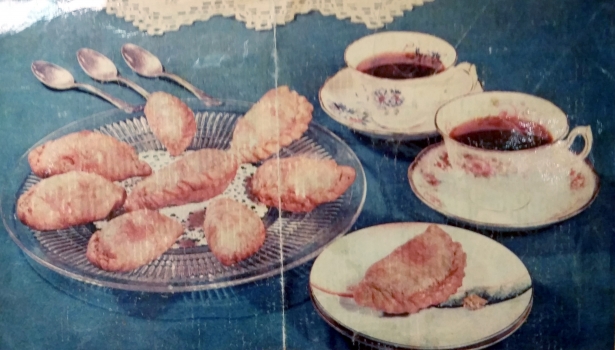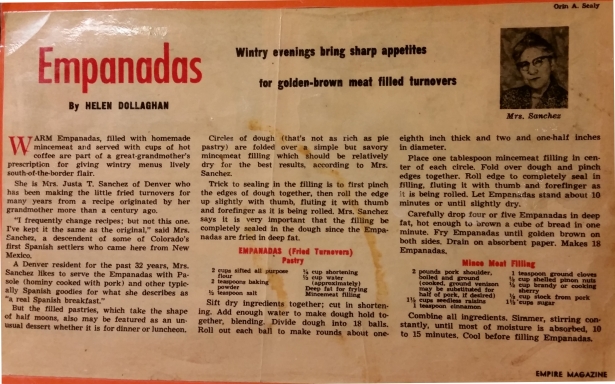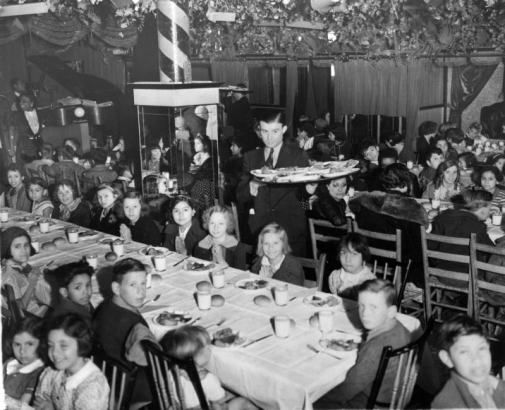My Great Aunt Justa is famous. Well, maybe not nationally famous, but she did make it onto the pages of the Denver Post once for her delicious empanada recipe which was handed down from our Spanish ancestors. It's still a tradition for my family to make these empanadas even though the mince meat filling has been a divisive issue during the holiday celebrations. (I fall in with the side that finds mince meat repulsive.)
The holiday season is a great time for taking notice of family traditions, like empanada making, and examining exactly why we do the things we do when gathering together with loved ones.
Of course, ethnicity is the main driver behind most traditions, but especially the traditions that make their way to the dinner table.
Many of our ancestors brought traditions from their home countries as they set up life in the United States and their food, like the people themselves, adapted to their new home. For example, my ancestors originated from Spain but came through New Spain, now Mexico, and eventually Southern Colorado. This might explain why Justa's empanadas are fried which is more traditional to Mexican food, as opposed to baked, which is more common in Spain.
Thinking about my own family's traditions led me to ask my colleagues about their family traditions.
Decker Branch Librarian, Natalie Braham shared with me her family's tradition of serving Zuppa di Baccala on Christmas Eve. Zuppa di Baccala is a traditional Italian soup made with salted cod (also known as baccala).
When she shared this recipe with me I couldn't help being reminded of how cod is such a staple in Spanish cuisine as well. I can imagine our ancestors could have shared a meal as new immigrants and found a common interest in the foods with which they were familiar. You can read all about the Italian tradition of The Feast of the Seven Fishes in Brian's blog from last week. Clearly we love writing about food in the Western History and Genealogy Department (WH and G).
WH and G Senior Librarian, James Rogers shared his German family tradition of having bratwurst for their holiday meal.
Bratwurst are sausages, usually pork, and have been a popular German food for centuries. Sauerkraut is often eaten with bratwurst in Germany and is eaten in several countries in the world with different variations on the recipe. During World War I Americans called sauerkraut victory cabbage because of manufacturers' fear that the American public would reject a German-named food. As with Freedom Fries, the name didn't stick.
North American cuisine is filled with foods inspired by immigrants. Just about every major American city is packed with Chinese restaurants; taco shops; fine Italian dining; and every food niche in-between. The holidays present a great opportunity for chatting with family members and figuring out exactly where your family traditions came from. Are there things you do each year to celebrate holidays that you never thought to ask where they came from?
WH and G has a massive collection of genealogy research materials that can aid you in finding out more about where your family, and their traditions, sprouted from. We offer classes and lectures throughout each month including a beginning genealogy class offered every second Saturday of the month. In the comment section please share your family's holiday food traditions that came from the old country, and come to WH and G to learn how to research your heritage using our resources.




Comments
My mom, who was Irish and
My mom, who was Irish and German, made mince meat pies, little pies, I think she made them in a muffin tin. There was no meat involved, it was raisins and things like that. My dad, Welsh and English background, made a pudding on Thanksgiving and it stored or aged until Christmas when he set it afire and we ate it.
Growing up in Chicago in the
Growing up in Chicago in the '50's-'60's, we would go to my mom's best friend, from High School's, for a Polish Christmas celebration. I remember kielbasa. A sister remembers kolaches.
The Museum of Science and Industry had performances of different ethnic groups celebrating Christmas.
I plan to try this recipe
I plan to try this recipe soon, I have made Empanadas before with store bought dough, but this doesn't seem to difficult.
Thanks for the article.
Add new comment